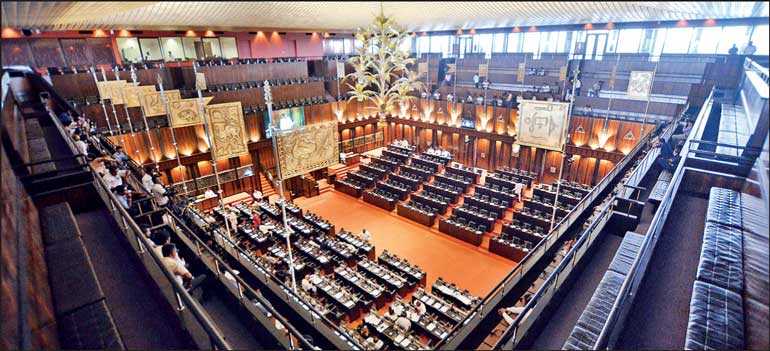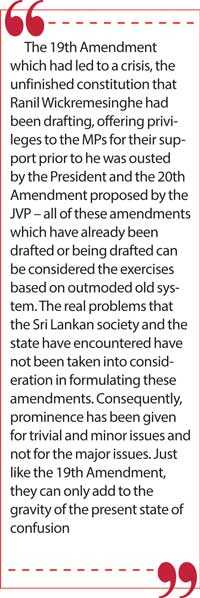Monday Feb 16, 2026
Monday Feb 16, 2026
Friday, 28 December 2018 00:00 - - {{hitsCtrl.values.hits}}

John Locke (1632-1704) was the first philosopher to introduce the concept of classical liberalism, a political ideology that argued that the sovereignty of the state rests on the people. The state derives its power from the people. He presented this idea to the world in a very clear formula. Bertrand Russell described him as the most distinguished and fortunate philosopher among all the other philosophers. He can also be considered the philosopher whose ideas have had the most influence on the American and French Revolutions.
Under the feudal monarchies that existed prior to the introduction of this concept by Locke, the sovereignty enjoyed by the king was considered a divine right, a power derived from god. Locke presented his ideas at a time when the people in European countries were revolting against feudalism and the monarchical rule and the modern states had been emerging.
Locke was of the view that the people are the real owners of the sovereignty of the state and hence the sovereignty of the state is always subjected to the will of the people. He interpreted the constitution of a country as a “social contract” entered into between the rulers and the ruled. The legitimacy of the authority of the state i.e. the interrelation between the authority of the state to rule and the people to obey the state rule is made possible only if the ruling party abides by the constitution, the social contract entered into between the two parties.
Later, this liberal concept on state presented by Locke was further developed by Charles Louis Montesquieu (1689-1755) and John Stuart Mill (1806-1873).The two principles i.e. people’s sovereignty and the recognition of constitution as a social contract can be considered as two important tenets of the democratic political science.
Constitution making (18th century)
It is with the fall of the feudal system giving way to a capitalist system that the modern nation states based on written constitutions begin to emerge. In this process, even at the early stages of the constitution making, the constitutions were drafted on the tenet that it was a contract between the rulers and the ruled and the sovereignty rests on the people.
The American Constitution, the first-ever written constitution, was drafted after the formation of the confederation of American colonies on 15 November 1777 by 13 colonies liberated from the British rule. It was adopted following a Constitutional Convention convened on 17 September 1787 in Philadelphia, Pennsylvania in order to resolve the conflicts that arose between the colonies. Seventy-three representatives, comprised of privileged elites from 12 colonies participated in this convention. The great statesmen of the calibre of George Washington, James Madison, Alexander Hamilton, Benjamin Franklin and James Wilson were among those present in this convention.
The drafting of the American Constitution took only 16 weeks. It consists of 7,000 words and seven clauses and it could be considered as the shortest written constitution in the world. 
Even at the beginning of the French revolution, there was a move underway to abolish the feudal state and draft a constitution to establish a democratic rule in order to safeguard the freedom of the people and the rights of the common people to private property. The representatives of the “Third Estate” of the National Assembly of the French monarchical system consisted of the non-privileged classes of common people gathered in a tennis court in Versailles to adopt a new constitution.
By the orders of King Louis XVI, the meeting hall was locked up and the place was guarded, preventing them from coming out of the hall and forcing them to disband the meeting. It caused fear and shock in the people gathered inside. But, all of them took an oath to defy the threats and obstacles that may come their way and never to leave the hall until a written constitution had been drafted and adopted. This historic oath made on 20 June 1789 is referred to in the annals of French history as the “Tennis Court Oath”.
Subsequently, in the face of the solidarity of the Third Estate, King Louis XVI relaxed the harsh policies that he had followed up to then and allowed the clergy and the nobility to join with the Third Estate in the National Assembly.
Along with that it became a national level constituent assembly. The number of people gathered there at the time of taking the oath was 789. With the joining of the clergy and the nobility the number went up to 1,177. The most renowned “Declaration of the Rights of Man” was drafted at this meeting. A radical constitution based on the freedom of the people was drafted. The time taken for this process was two years. The men were granted franchise and a direct voting system, people’s committee system for review of laws and an executive system consisted of 25 members were introduced.
However, in the face of the violent political atmosphere emerged in the country, Napoleon was invited to contain the situation. Consequently, Napoleon captured the power, transformed France again into a monarchical system and ascended the throne as the emperor of France. In this backdrop, the constitution drafted for the 1st Republic came to an end and was abandoned.
Constitution making (20th Century)
The present day constitution experts do not consider the constitution model adopted by the United States of America, France and the other European countries in the 18th century, as an appropriate model for the present. The legislative process of that time was focused on educated male elites. For example, the process of constitution making during that time did not involve black people or slaves. There was no involvement of women. It was then taken for granted that the male had the right to represent the female.
The problems that the 21st century states and their societies encountered could not be compared to be identical. The biggest problem to be solved by the European nations and the states that emerged in the 18th century after defeating the rule of dictatorial monarchies was to adopt a constitution conducive to the formation of a system of government that would safeguard the private property and the human liberty.
Emancipation from colonial rule, building of the nation after gaining independence, converting the colonial society into a free society to be compatible with the newly gained independence and adopting appropriate constitutions against a background of changing world conditions could be regarded as the biggest problems to be solved by the countries which remained under the colonial rule in 19th and 20th centuries. Even after gaining independence, most of the countries failed to build the modern nation and modern state. Consequently, during the 21st century, it became necessary to draw up new constitutions to introduce structural reforms to recreate the society and the state which had been rendered feeble and crippled in a welter of internal conflicts between diverse factions based on ethnic, caste, religious or language differences.
In this context, the countries and the states which had encountered a similar crisis in the 21st century were compelled to adopt an appropriate model to draw up a constitution that would provide a basis for all parties involved in the internal conflicts as well as the general public to participate in the process of drafting a constitution and the initiation of a public dialogue to reach a consensus in order to recreate the disintegrated society and the state , the fabric of which had cracked and reached the verge of collapse .
In the light of new experiments carried out in this respect, a situation arose in which the making of a democratic constitution to establish a democratic system of government was no longer considered a task to be confined and entrusted to a small group of social elites or the people’s representatives in the legislature. It became a democratic process owned and a participated actively by the people.
The knowledge of Sri Lanka in the sphere of constitution making is scant. Not only the general public, even the political leaders and the political parties have only a limited knowledge on the subject. Even the knowledge of the Sri Lankan experts on the subject is limited to outdated and archaic concepts. Their understanding of new concepts is negligible. Consequently, when they are involved in the process of constitution making, they tend to put everything into the old frame instead of adopting a new frame in line with the new concepts and the pressing needs.
The 19th Amendment which had led to a crisis, the unfinished constitution that Ranil Wickremesinghe had been drafting, offering privileges to the MPs for their support prior to he was ousted by the President and the 20th Amendment proposed by the JVP – all of these amendments which have already been drafted or being drafted can be considered the exercises based on outmoded old system.
The real problems that the Sri Lankan society and the state have encountered have not been taken into consideration in formulating these amendments. Consequently, prominence has been given for trivial and minor issues and not for the major issues. Just like the 19th Amendment, they can only add to the gravity of the present state of confusion.
Constitution making and the Law
Article 25 of the International Covenant on Civil and Political Rights (ICCPR) has granted the people the right to participate in the conduct of public affairs in his or her country either directly or through freely elected representatives. At first, this right was not considered a right to engage actively in public affairs. But, in the course of time, by a number of internationally important Court rulings, it has been established as a right of the public to actively engage in the constitutional process.
The complaint made by the leaders of the Mikmaq tribal society of Canada to the Human Rights Committee that the Canadian government has seriously violated the fundamental rights of the people of their tribe by not involving them in the drafting of the first constitution of Canada, the proceedings of this case and the judgment given – (Marshal V Canada: Human Rights Committee Decision 1991) can be cited as one such important Court decisions.
The Human Rights Committee did not find that the Canadian government was guilty of the failure to invite representatives of the Mi’kmaq tribal society to the constitutional conferences on aboriginal matters, which constituted conduct of public affairs, as the government had given the opportunity for 600 aborigines belonged to four societies to actively engage in the process of drafting the constitution. But, in this judgment, the Human Rights Committee had unequivocally admitted the right of the people to actively engage in constitution making process without discrimination and without unreasonable restrictions.
The interpretation given by the United Nations Commission on Human Rights (UNCHR) Textual Authority on the right to engage in the conduct of public affairs as enshrined in the Article 25 of the International Covenant on Civil and Political Rights (ICCPR) can be considered an important interpretation having a special bearing on international law.
The Article 25 of the ICCPR while stressing the right of the citizens to engage in the conduct of public affairs emphasises that the public has a right of active participation on occasions when the citizens make demands for a change of their constitution. Accordingly, the right to engage in the conduct of public affairs can be considered as another constitutional principal that has entered into the scope of constitution making by expanding its horizon and the perspective.
The judgment given by the Supreme Court of Canada regarding the legality of an unilateral secession of Quebec Province from Canada is an important judgment that had made people’s participation an important determinant in a legal process of constitution making. The case was initiated in 1996 and the judgment declared in 1998.
This judgment can be considered an instance in which the right of the public to participate in the process of constitution making had been broadly and comprehensively interpreted. It clearly states that the people’s participation in a legal process of constitution making is an important determinant. According to this judgment no one can maintain a monopoly on truth and even at a time when the unity of a nation is in danger, the government has a responsibility to initiate a dialogue on constitutional issues.
Nicaragua, Uganda, Brazil, Rwanda and South Africa can be considered as the countries which had adopted their constitutions with an active public participation. Of these countries, South Africa offers the best and the most exemplary model. There, the ideas received from the people during the course of constitution making reached the mark of two million. I do not intend to deal with the lessons that Sri Lanka could learn from these five countries as it would make this article unduly longer than unnecessarily.
The path that Sri Lanka should choose
Regrettably, both the state and the society of Sri Lanka are in a putrid state. What the country needs today is not a superficial or deceptive change, but a true change that could effect a wholesome and far-reaching transformation in the overall picture of Sri Lanka. Unfortunately, the political leaders of the country and the representatives of the legislature are in a position in which they have completely lost integrity, wisdom and discipline, the essential qualities and prerequisites needed for making a good constitution capable of effecting such a transformation.
On the other hand, adoption of such a constitution will invariably deprive them of all privileges unduly earned and enjoyed by them; hence, there can’t be a true need or moral capacity in them to give the leadership for such a program.
However, there is no harm in getting them involved in the constitution making process. But the monitoring authority of the process should rest on the people. The ultimate sovereignty as per the constitution of the country rests on the people; they cannot be deprived of this power. If the constitution is acknowledged to be a contract entered into between the rulers and the citizens, then the people should have the right to become a strong party to the process followed in drafting the contract.
What has always happened in the past was that the Legislature which held the ruling power drafted the contract unilaterally and enacted it without getting it ratified by the people. This game should not be allowed to persist any longer. When the Legislature becomes one party to the making of the constitution, the public who possess the sovereignty should be the other party.
The Punarudaya Movement is of the view that if Sri Lanka is to be saved from its present predicament, it has to make a bigger effort than South Africa made in making an appropriate constitution for the country. I hope to discuss the mechanism of making a constitution and the elements that should go into the constitution in the next article.